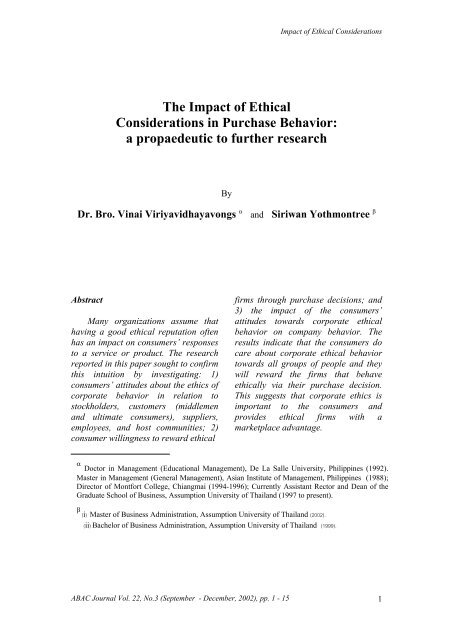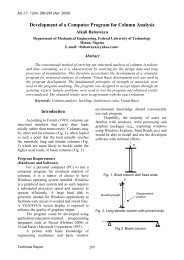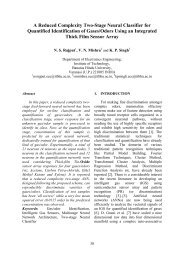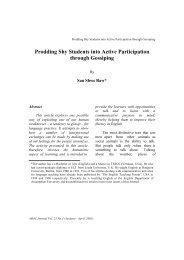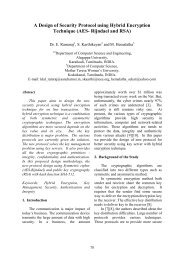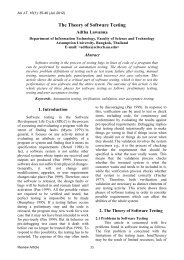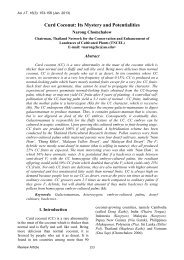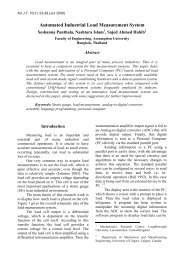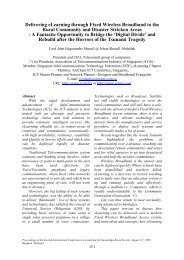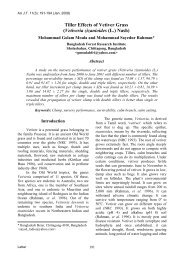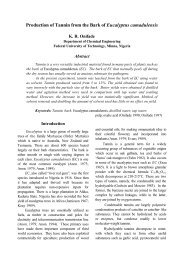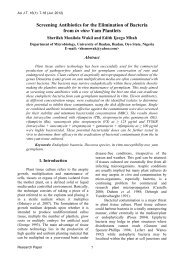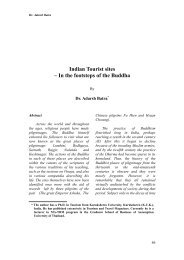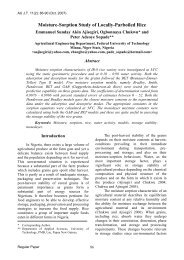The Impact of Ethical Considerations in Purchase Behavior: a ...
The Impact of Ethical Considerations in Purchase Behavior: a ...
The Impact of Ethical Considerations in Purchase Behavior: a ...
You also want an ePaper? Increase the reach of your titles
YUMPU automatically turns print PDFs into web optimized ePapers that Google loves.
<strong>Impact</strong> <strong>of</strong> <strong>Ethical</strong> <strong>Considerations</strong><br />
<strong>The</strong> <strong>Impact</strong> <strong>of</strong> <strong>Ethical</strong><br />
<strong>Considerations</strong> <strong>in</strong> <strong>Purchase</strong> <strong>Behavior</strong>:<br />
a propaedeutic to further research<br />
By<br />
Dr. Bro. V<strong>in</strong>ai Viriyavidhayavongs α and Siriwan Yothmontree β<br />
Abstract<br />
Many organizations assume that<br />
hav<strong>in</strong>g a good ethical reputation <strong>of</strong>ten<br />
has an impact on consumers’ responses<br />
to a service or product. <strong>The</strong> research<br />
reported <strong>in</strong> this paper sought to confirm<br />
this <strong>in</strong>tuition by <strong>in</strong>vestigat<strong>in</strong>g: 1)<br />
consumers’ attitudes about the ethics <strong>of</strong><br />
corporate behavior <strong>in</strong> relation to<br />
stockholders, customers (middlemen<br />
and ultimate consumers), suppliers,<br />
employees, and host communities; 2)<br />
consumer will<strong>in</strong>gness to reward ethical<br />
firms through purchase decisions; and<br />
3) the impact <strong>of</strong> the consumers’<br />
attitudes towards corporate ethical<br />
behavior on company behavior. <strong>The</strong><br />
results <strong>in</strong>dicate that the consumers do<br />
care about corporate ethical behavior<br />
towards all groups <strong>of</strong> people and they<br />
will reward the firms that behave<br />
ethically via their purchase decision.<br />
This suggests that corporate ethics is<br />
important to the consumers and<br />
provides ethical firms with a<br />
marketplace advantage.<br />
α Doctor <strong>in</strong> Management (Educational Management), De La Salle University, Philipp<strong>in</strong>es (1992).<br />
Master <strong>in</strong> Management (General Management), Asian Institute <strong>of</strong> Management, Philipp<strong>in</strong>es (1988);<br />
Director <strong>of</strong> Montfort College, Chiangmai (1994-1996); Currently Assistant Rector and Dean <strong>of</strong> the<br />
Graduate School <strong>of</strong> Bus<strong>in</strong>ess, Assumption University <strong>of</strong> Thailand (1997 to present).<br />
β (i) Master <strong>of</strong> Bus<strong>in</strong>ess Adm<strong>in</strong>istration, Assumption University <strong>of</strong> Thailand (2002).<br />
(ii) Bachelor <strong>of</strong> Bus<strong>in</strong>ess Adm<strong>in</strong>istration, Assumption University <strong>of</strong> Thailand (1999).<br />
ABAC Journal Vol. 22, No.3 (September - December, 2002), pp. 1 - 15 1
Dr. Bro. V<strong>in</strong>ai & Siriwan Yothmontree<br />
1. INTRODUCTION<br />
Ethics refers to pr<strong>in</strong>ciples or values<br />
that guide behavior (Sherw<strong>in</strong>, 1983). It<br />
is sometimes said that bus<strong>in</strong>ess and<br />
ethics do not mix; for some, the pr<strong>of</strong>its<br />
that are the basis <strong>of</strong> a firm’s survival are<br />
said to take precedence over moral<br />
pr<strong>in</strong>ciples or values. <strong>The</strong> assumption is<br />
that the cost <strong>of</strong> ethical behavior<br />
outweighs any benefits <strong>of</strong> deceptive<br />
advertis<strong>in</strong>g that might for example, lead<br />
to higher sales. This rejection <strong>of</strong> ethics<br />
ignores the role <strong>of</strong> a bus<strong>in</strong>ess as part <strong>of</strong><br />
the social fabric and thus subject to<br />
moral constra<strong>in</strong>ts. We expect a good<br />
life and a good society from a free<br />
market system and this demands a fair<br />
distribution <strong>of</strong> goods and services. Also<br />
important are the social demands<br />
related to pollution, the depletion <strong>of</strong><br />
natural resources, the quality and<br />
character <strong>of</strong> the work environment, and<br />
the safety <strong>of</strong> consumers. For this<br />
reason, ethics is necessary for bus<strong>in</strong>ess.<br />
Beg<strong>in</strong>n<strong>in</strong>g <strong>in</strong> the 1980s there was a<br />
grow<strong>in</strong>g concern about bus<strong>in</strong>ess ethics<br />
driven precisely by the awareness <strong>of</strong> the<br />
impact that bus<strong>in</strong>ess organizations had<br />
on the natural and social environment.<br />
This concern has cont<strong>in</strong>ued as the<br />
concentration <strong>of</strong> capital <strong>in</strong>to larger<br />
units, along with globalization, has<br />
resulted as the <strong>in</strong>creas<strong>in</strong>g power and<br />
<strong>in</strong>fluence <strong>of</strong> <strong>in</strong>dustrial corporations<br />
made their policies and actions more<br />
able to threaten or enhance the natural<br />
environment and the political stability<br />
and the prosperity <strong>of</strong> host societies.<br />
Given this new factor, it is hardly<br />
surpris<strong>in</strong>g that the ethical basis <strong>of</strong> their<br />
behavior has become a focus <strong>of</strong> concern<br />
(Smith and Johnson, 1996).<br />
In the light <strong>of</strong> this grow<strong>in</strong>g<br />
concern, many lead<strong>in</strong>g bus<strong>in</strong>ess schools<br />
have <strong>in</strong>troduced courses <strong>in</strong> bus<strong>in</strong>ess<br />
ethics and appo<strong>in</strong>ted pr<strong>of</strong>essors to teach<br />
and research the subject. Books,<br />
articles, and new journals exclusively<br />
devoted to bus<strong>in</strong>ess ethics cover<br />
subjects rang<strong>in</strong>g from unethical<br />
market<strong>in</strong>g practices to harassment <strong>in</strong> the<br />
workplace. As <strong>of</strong> 2002, two <strong>of</strong> the ma<strong>in</strong><br />
academic publications, the Journal <strong>of</strong><br />
Bus<strong>in</strong>ess Ethics and Bus<strong>in</strong>ess Ethics<br />
Quarterly are <strong>in</strong> their 21 st and 12 th year<br />
<strong>of</strong> publication, respectively. Moreover,<br />
there are large numbers <strong>of</strong> websites that<br />
provide <strong>in</strong>formation, articles, research<br />
results, and discussion forums for those<br />
<strong>in</strong>terested <strong>in</strong> bus<strong>in</strong>ess ethics.<br />
Various types <strong>of</strong> ethics-oriented<br />
corporate structures and activities have<br />
become common <strong>in</strong> western bus<strong>in</strong>ess<br />
organizations over this last twenty<br />
years. In a follow-up survey conducted<br />
by the Center for Bus<strong>in</strong>ess Ethics, 93%<br />
<strong>of</strong> the 207 U.S. corporations respond<strong>in</strong>g<br />
to the survey stated that they were<br />
currently tak<strong>in</strong>g steps to <strong>in</strong>corporate<br />
ethics <strong>in</strong>to the policies and culture <strong>of</strong><br />
their firms (Center For Bus<strong>in</strong>ess Ethics,<br />
1992). A survey <strong>of</strong> the Fortune 1000<br />
showed a high level <strong>of</strong> corporate<br />
adoption <strong>of</strong> ethics policies (Weaver,<br />
Trev<strong>in</strong>i, and Cochran, 1999). In a<br />
survey <strong>of</strong> 188 firms <strong>in</strong> the USA and<br />
West European countries, 78 firms<br />
stated that they had codes <strong>of</strong> ethics<br />
2
<strong>Impact</strong> <strong>of</strong> <strong>Ethical</strong> <strong>Considerations</strong><br />
(Cather<strong>in</strong>e and Schlegelmilch, 1990).<br />
Between 1987 and 1991, a quarter <strong>of</strong><br />
companies surveyed <strong>in</strong>ternationally had<br />
sponsored new ethics programs and<br />
there was a 40% <strong>in</strong>crease <strong>in</strong> the number<br />
<strong>of</strong> European company CEOs mak<strong>in</strong>g<br />
ethical announcements (Barlett and<br />
Preston, 2000). Boe<strong>in</strong>g, Champion<br />
International, Chemical Bank, General<br />
mills, GTE, Hewlett—Packard, Johnson<br />
and Johnson, Norton, and Xerox all<br />
have made a public commitment to<br />
higher ethical standards as a key<br />
component to their overall bus<strong>in</strong>ess<br />
strategy (Laczniak and Murhy, 1993).<br />
<strong>The</strong> Body Shop, IBM, Esso, Procter and<br />
Gamble, Audi, ICI, and Mobil are<br />
among the firms that have <strong>in</strong>itiated<br />
actions to encourage their employees to<br />
act ethically <strong>in</strong> their decision-mak<strong>in</strong>g<br />
process through written codes <strong>of</strong><br />
conducts (Cather<strong>in</strong>e and Schlegelmilch,<br />
1990). <strong>The</strong>se firms believe that ethics is<br />
an important component <strong>of</strong><br />
organizational effectiveness. Most<br />
companies recognize that their ethical<br />
actions improve their image among<br />
consumers, stockholders, the f<strong>in</strong>ancial<br />
community, and the public. <strong>Ethical</strong><br />
practices here are seen not simply as<br />
part <strong>of</strong> be<strong>in</strong>g a good corporate citizen<br />
but also as good bus<strong>in</strong>ess, result<strong>in</strong>g <strong>in</strong> a<br />
favorable image and ultimately <strong>in</strong><br />
<strong>in</strong>creased sales. We postulate that<br />
perceptions <strong>of</strong> a company conduct<strong>in</strong>g<br />
bus<strong>in</strong>ess unethically, negatively affect<br />
consumer purchase decisions.<br />
In today’s highly competitive<br />
environment, many firms attempt to<br />
promote themselves by mak<strong>in</strong>g public<br />
their ethical behavior. Mist<strong>in</strong>e<br />
advertisements, for example, seek to<br />
<strong>in</strong>form the public that the firm behaves<br />
ethically, tak<strong>in</strong>g employees’ welfare<br />
<strong>in</strong>to its decisions. This raises specific<br />
questions asked above and raises the<br />
general research problem <strong>of</strong>: “whether<br />
consideration <strong>of</strong> consumers for<br />
corporate ethical behavior towards:<br />
stockholders, customers, suppliers,<br />
employees and host communities has an<br />
impact on consumers’ purchase<br />
decisions”<br />
2. OBJECTIVES<br />
<strong>The</strong> purposes <strong>of</strong> this research are to<br />
<strong>in</strong>vestigate whether:<br />
(1) consumers care about corporate<br />
ethical behavior;<br />
(2) they are will<strong>in</strong>g to reward the<br />
ethical firms through their purchase<br />
decisions; and<br />
(3) consideration <strong>of</strong> the consumers<br />
for corporate ethical behavior has an<br />
impact on consumers’ purchase<br />
decisions.<br />
3. CONCEPTUAL FOUNDATION<br />
AND HYPOTHESES<br />
Conceptual Foundation<br />
Bus<strong>in</strong>ess Ethics<br />
Bus<strong>in</strong>ess ethics is the study <strong>of</strong> the<br />
relationship about what conduct is<br />
ethically right for bus<strong>in</strong>esses (H<strong>of</strong>fthan<br />
ABAC Journal Vol. 22, No.3 (September - December, 2002), pp. 1 - 15 3
Dr. Bro. V<strong>in</strong>ai & Siriwan Yothmontree<br />
and Federick, 1995). Ethics seeks to<br />
answer questions about whether we<br />
ought or ought not to perform certa<strong>in</strong><br />
k<strong>in</strong>ds <strong>of</strong> actions; and whether those<br />
actions are good or bad, right or wrong,<br />
virtuous or vicious, worthy <strong>of</strong> praise or<br />
blame, reward or punishment and so on<br />
(Chryssides and Kaler, 1996).<br />
Stakeholder concept<br />
<strong>The</strong> stakeholder concept must be<br />
considered when deal<strong>in</strong>g with bus<strong>in</strong>ess<br />
ethics. Stakeholder management<br />
<strong>in</strong>volves allocat<strong>in</strong>g organizational<br />
resources <strong>in</strong> such a way as to take <strong>in</strong>to<br />
account the impact <strong>of</strong> those allocations<br />
on various groups with<strong>in</strong> and outside<br />
organizations (Freeman, 1984). A<br />
stakeholder is any group or <strong>in</strong>dividual<br />
who is (or can be) affected by the<br />
achievement <strong>of</strong> a firm’s objectives. For<br />
example, a large organization’s typical<br />
stakeholders <strong>in</strong>clude stockholders,<br />
customers, suppliers, employees, and<br />
host communities. <strong>The</strong> stakeholder<br />
concept is useful <strong>in</strong> ethical analysis<br />
because it allows firms to gauge the<br />
impact <strong>of</strong> their decision on several<br />
affected groups.<br />
Corporate ethical behavior<br />
Corporate ethical behavior is<br />
understood to be the behavior or action<br />
<strong>of</strong> corporations that should be<br />
performed and can be considered as<br />
right.<br />
In this study, ethical behavior is<br />
divided <strong>in</strong>to 5 major areas <strong>of</strong><br />
stakeholder impact: corporate behavior<br />
towards: stockholders, customers<br />
(middlemen and ultimate consumers),<br />
suppliers, employees, and host<br />
communities.<br />
Perception<br />
Stanton, Etzel and Walker (1994)<br />
def<strong>in</strong>e perception as the process <strong>of</strong><br />
receiv<strong>in</strong>g, organiz<strong>in</strong>g, and assign<strong>in</strong>g<br />
mean<strong>in</strong>g to <strong>in</strong>formation or stimuli<br />
detected by the five senses. Perception<br />
plays a major role <strong>in</strong> buy<strong>in</strong>g decisions<br />
where alternatives are compared. What<br />
we perceive and the mean<strong>in</strong>g given to<br />
what is perceived depend both on the<br />
object itself and our experiences. In an<br />
<strong>in</strong>stant the m<strong>in</strong>d is capable <strong>of</strong> receiv<strong>in</strong>g<br />
<strong>in</strong>formation, compar<strong>in</strong>g it to a huge<br />
store <strong>of</strong> images <strong>in</strong> memory, and<br />
provid<strong>in</strong>g an <strong>in</strong>terpretation. Perception<br />
occurs quickly and <strong>of</strong>ten with very little<br />
<strong>in</strong>formation, but it is a powerful factor<br />
<strong>in</strong> decision-mak<strong>in</strong>g. Changed product<br />
features result <strong>in</strong> new perceptions which<br />
affect sales.<br />
Perception also <strong>in</strong>volves<br />
<strong>in</strong>terpret<strong>in</strong>g directly the world through<br />
the senses and, more broadly,<br />
<strong>in</strong>formation received through the<br />
senses. Perception is the entire process<br />
by which an <strong>in</strong>dividual becomes aware<br />
<strong>of</strong> the environment and <strong>in</strong>terprets it so<br />
that it will fit <strong>in</strong>to his or her frame <strong>of</strong><br />
reference. Perception provides a<br />
particular emphasis or flavor to the<br />
consumer’s understand<strong>in</strong>g <strong>of</strong> all<br />
4
<strong>Impact</strong> <strong>of</strong> <strong>Ethical</strong> <strong>Considerations</strong><br />
considerations related to the decision<br />
process. In problem solv<strong>in</strong>g, the<br />
consumers’ perception <strong>of</strong> problems<br />
beg<strong>in</strong>s the process, and the perception<br />
<strong>of</strong> alternatives, selection criteria, and<br />
reasonableness determ<strong>in</strong>es how the<br />
perceived problem is resolved.<br />
Decisions that are based on chance,<br />
habit, impulse, social orientation, and<br />
heredity also have perception at their<br />
heart. In other words, perception flavors<br />
the entire consumer decision-mak<strong>in</strong>g<br />
process, <strong>in</strong>clud<strong>in</strong>g the perception<br />
<strong>in</strong>volved <strong>in</strong> post-purchase assessment<br />
(Walters and Bergill, 1989).<br />
<strong>The</strong> Perceived Importance <strong>of</strong><br />
Corporate <strong>Ethical</strong> <strong>Behavior</strong> and the<br />
<strong>Purchase</strong> Decision<br />
Although there is little research<br />
about the bus<strong>in</strong>ess effects <strong>of</strong> consumer<br />
perceptions <strong>of</strong> ethical behavior, the<br />
work <strong>of</strong> Creyer and Ross (1997),<br />
study<strong>in</strong>g “the <strong>in</strong>fluence <strong>of</strong> firm behavior<br />
on purchase <strong>in</strong>tention: do consumers<br />
really care about bus<strong>in</strong>ess ethics”<br />
provided a guidel<strong>in</strong>e for<br />
conceptualiz<strong>in</strong>g the research<br />
framework.<br />
Perception is one <strong>of</strong> the factors<br />
that plays an important role <strong>in</strong><br />
buy<strong>in</strong>g behavior, it <strong>in</strong>fluences<br />
consumers’ purchase decisions. In<br />
this research study the researcher<br />
wishes to study the consumers’<br />
perceptions <strong>of</strong> the importance <strong>of</strong><br />
corporate ethical behavior and their<br />
impact on consumers’ purchase<br />
decisions.<br />
In the present work, the buyer<br />
decision process is viewed <strong>in</strong> terms <strong>of</strong> a<br />
set <strong>of</strong> sequential stages <strong>in</strong> which the<br />
buyer moves from problem recognition,<br />
through <strong>in</strong>formation gather<strong>in</strong>g and<br />
alternative evaluation, to the actual<br />
decision to buy a product from a<br />
particular dealer. Information is<br />
processed, and alternatives are<br />
evaluated accord<strong>in</strong>g to some set <strong>of</strong><br />
comparison factors or decision criteria<br />
derived from experience, value, and<br />
expectations. <strong>The</strong> importance given to<br />
these criteria vary <strong>in</strong> degree <strong>in</strong> shap<strong>in</strong>g<br />
alternative evaluations and f<strong>in</strong>al<br />
selection (Engel et al., 1993) and<br />
generally such criteria are grounded <strong>in</strong><br />
the attributes and benefits buyers desire<br />
<strong>in</strong> the products they buy and the stores<br />
<strong>in</strong> which they shop. Relevant criteria<br />
may <strong>in</strong>clude price, color, style, op<strong>in</strong>ion,<br />
quality, product safety, durability,<br />
status, and warranty. Decisions are<br />
made on the basis <strong>of</strong> the relative weight<br />
given to these <strong>in</strong> a particular case; <strong>in</strong><br />
some cases, for example, price will be<br />
more important than style while <strong>in</strong><br />
others style may be more important<br />
than price. To conclude, when<br />
consumers use a particular criterion or<br />
attribute to evaluate which products or<br />
brands they would purchase, they<br />
should perceive that this particular<br />
criterion or attribute is important dur<strong>in</strong>g<br />
their purchase decision.<br />
Research <strong>of</strong> Creyer and Ross<br />
(1997) suggests that consumers<br />
perceive the ethics <strong>of</strong> a firm’s behavior<br />
as an important consideration dur<strong>in</strong>g the<br />
purchase decision, mak<strong>in</strong>g it more<br />
ABAC Journal Vol. 22, No.3 (September - December, 2002), pp. 1 - 15 5
Dr. Bro. V<strong>in</strong>ai & Siriwan Yothmontree<br />
likely that they would purchase a<br />
product or service from that firm rather<br />
than from a competitor perceived to be<br />
less ethical. <strong>The</strong> purchase decision is<br />
thus the dependent variable <strong>of</strong> the<br />
present study.<br />
A review <strong>of</strong> literature thus suggests<br />
that the perceived importance <strong>of</strong><br />
corporate ethical behavior has a<br />
significant effect on the will<strong>in</strong>gness to<br />
reward the firms through purchase<br />
decisions. Given the conceptual<br />
framework presented <strong>in</strong> figure I, the<br />
variable <strong>of</strong> primary <strong>in</strong>terest <strong>in</strong> this study<br />
is the purchase decision, with perceived<br />
ethical status as an <strong>in</strong>dependent<br />
variable. This <strong>in</strong>dependent variable is<br />
multi-dimensional <strong>in</strong>s<strong>of</strong>ar as different<br />
ethical issues – refusal to discrim<strong>in</strong>ate<br />
on the basic <strong>of</strong> age rather than<br />
disclosure or product risks, for example<br />
– may be given vary<strong>in</strong>g weights by<br />
different consumers. Thus, the<br />
researcher divided corporate behavior<br />
<strong>in</strong>to five groups characterized by<br />
stakeholders: stockholders, customers<br />
(middlemen and ultimate consumers),<br />
suppliers, employees and host<br />
communities.<br />
Hypotheses<br />
Eleven hypotheses were proposed<br />
<strong>in</strong> this study. A univariate analysis was<br />
used to test whether the consumers care<br />
about corporate ethical behavior<br />
towards the five stakeholders (Hol to<br />
Ho5) and the will<strong>in</strong>gness <strong>of</strong> consumers<br />
to reward the firms through purchase<br />
decisions (Ho6). A bivariate analysis is<br />
used for measur<strong>in</strong>g the relationship<br />
between the dependent and the<br />
<strong>in</strong>dependent variables: the will<strong>in</strong>gness<br />
to reward the firms via purchase<br />
decision and consideration for corporate<br />
ethical behavior towards the five groups<br />
<strong>of</strong> people (Ho7 to Hol1).<br />
Independent Variable<br />
Dependent Variable<br />
Consideration for corporate ethical behavior<br />
• Consideration for corporate ethical behavior<br />
towards stockholders<br />
• Consideration for corporate ethical behavior<br />
towards customers<br />
- Middlemen<br />
- Ultimate consumers<br />
• Consideration for corporate ethical behavior<br />
towards suppliers<br />
• Consideration for corporate ethical behavior<br />
towards employees<br />
• Consideration for corporate ethical behavior<br />
towards host communities<br />
Will<strong>in</strong>gness to reward<br />
the firms via purchase<br />
decision<br />
Figure 1. Conceptual Framework<br />
<strong>of</strong> the Research Study<br />
6
<strong>Impact</strong> <strong>of</strong> <strong>Ethical</strong> <strong>Considerations</strong><br />
4.METHOD<br />
Sample<br />
Data were collected with a self—<br />
adm<strong>in</strong>istered questionnaire completed<br />
by Bangkok residents aged between 20<br />
and 40. 385 sets <strong>of</strong> questionnaires were<br />
distributed by hand to the respondents<br />
at department stores, government<br />
<strong>of</strong>fices, public <strong>of</strong>fices, schools, and<br />
communities located <strong>in</strong> Bangkok us<strong>in</strong>g<br />
the convenience sampl<strong>in</strong>g technique for<br />
selection.<br />
Research Instrument<br />
<strong>The</strong> scale used <strong>in</strong> this study was<br />
developed from Creyer and Ross’s<br />
work. A 35-item questionnaire was<br />
constructed to measure the follow<strong>in</strong>g<br />
two constructs: (1) the consumers’<br />
consideration about corporate ethical<br />
behavior towards five groups <strong>of</strong><br />
stakeholders: stockholders, middlemen,<br />
ultimate consumers, suppliers,<br />
employees, and host communities; and<br />
(2) the will<strong>in</strong>gness to reward the firms<br />
through purchase decisions.<br />
Responses to the items were<br />
measured on a seven-po<strong>in</strong>t scale, with<br />
‘1’ <strong>in</strong>dicat<strong>in</strong>g “disagree completely”<br />
and 7 “agree completely”. An overall<br />
score for each construct was obta<strong>in</strong>ed<br />
by averag<strong>in</strong>g the response to the<br />
appropriate items.<br />
<strong>The</strong> pretest <strong>of</strong> 40 sets <strong>of</strong> Thai<br />
questionnaires yielded these reliabilities<br />
figures towards stockholders,<br />
middlemen, ultimate consumers,<br />
suppliers, employees, and host<br />
communities and the will<strong>in</strong>gness to<br />
reward the firms via purchase decision<br />
are 0.76, 0.86, 0.92, 0.89, 0.90, 0.89<br />
and 0.76 respectively. <strong>The</strong> reliabilities<br />
<strong>of</strong> the scale is adequate accord<strong>in</strong>g to<br />
Nunnally’s (1978) m<strong>in</strong>imum standard<br />
<strong>of</strong> reliability: 0.7.<br />
5. RESULTS<br />
<strong>The</strong> consumers’ consideration for<br />
corporate ethical behavior<br />
<strong>The</strong> mean responses for the<br />
consumers’ consideration for corporate<br />
ethical behavior and the will<strong>in</strong>gness to<br />
reward the firms via purchase decision<br />
are given <strong>in</strong> Table I. <strong>The</strong>se results<br />
<strong>in</strong>dicate that this group <strong>of</strong> the<br />
consumers care about corporate ethical<br />
behavior towards the groups <strong>of</strong><br />
stakeholders. <strong>The</strong> mean value <strong>of</strong> the<br />
will<strong>in</strong>gness to reward the firms through<br />
purchase decision is 4.7953. This<br />
<strong>in</strong>dicates that the consumers are will<strong>in</strong>g<br />
to reward the ethical firms through their<br />
purchase decisions. A T-test was used<br />
to determ<strong>in</strong>e whether the mean for each<br />
construct is greater than four, the<br />
midpo<strong>in</strong>t <strong>of</strong> the seven po<strong>in</strong>t measures.<br />
For all constructs, the means are<br />
significantly greater than four.<br />
Accord<strong>in</strong>gly, Hol to Ho6 are accepted,<br />
<strong>in</strong>dicat<strong>in</strong>g that the consumers consider<br />
that corporate ethical behavior towards<br />
all groups <strong>of</strong> people are important<br />
dur<strong>in</strong>g their purchase decision; they do<br />
care about corporate ethical behavior<br />
ABAC Journal Vol. 22, No.3 (September - December, 2002), pp. 1 - 15 7
Dr. Bro. V<strong>in</strong>ai & Siriwan Yothmontree<br />
and they will reward the firms that<br />
behave ethically via their purchase<br />
decision.<br />
Table I. Descriptive Statistics and Univariate Analysis Results<br />
Standard<br />
Measure Mean deviation<br />
T-statistics<br />
Consideration for corporate ethical behavior 4.3558 0.7 184 9.179 a<br />
towards stockholders<br />
Consideration for corporate ethical behavior 4.4208 0.7294 11.3 19<br />
towards middlemen<br />
Consideration for corporate ethical behavior 5.4888 0.8776 33.325<br />
towards ultimate consumers<br />
Consideration for corporate ethical behavior 4.6229 0.7555 16.177<br />
towards suppliers<br />
Consideration for corporate ethical behavior 5.0109 0.8039 24.674<br />
towards employees<br />
Consideration for corporate ethical behavior 5.162 1 0.8429 27.050<br />
towards host communities<br />
<strong>The</strong> will<strong>in</strong>gness to reward the firms via purchase 4.7953 0.6995 22.311<br />
decision<br />
Notes: a T-statistical tests whether the mean <strong>of</strong> the scale is significantly different<br />
from the midpo<strong>in</strong>t <strong>of</strong> the scale (value <strong>of</strong> 4); all are statistically significant at the<br />
p
<strong>Impact</strong> <strong>of</strong> <strong>Ethical</strong> <strong>Considerations</strong><br />
Table II. Regression Analyses<br />
Correlation<br />
Measure Beta T-statistic Coefficient F-statistic<br />
Consideration for corporate ethical 0.369 8.019 a 0.379 64.308 b<br />
behavior towards stockholders<br />
Consideration for corporate ethical 0.392 8.770 0.409 76.907<br />
behavior towards middlemen<br />
Consideration for corporate ethical 0.549 9.5 84 0.438 90.901<br />
behavior towards ultimate consumers<br />
Consideration for corporate ethical 0.392 9.137 0.423 83 .485<br />
behavior towards suppliers<br />
Consideration for corporate ethical 0.423 10.883 0.486 118.446<br />
behavior towards employees<br />
Consideration for corporate ethical 0.355 9.267 0.428 85.87 1<br />
behavior towards host communities<br />
a<br />
Notes: T-statistical tests whether consideration <strong>of</strong> the consumers for<br />
corporate ethical behavior has a relationship with the will<strong>in</strong>gness to reward the firms<br />
via purchase decision; all are statistically significant at the p
Dr. Bro. V<strong>in</strong>ai & Siriwan Yothmontree<br />
stockholders, middlemen, ultimate<br />
consumers, suppliers, employees<br />
and host communities;<br />
2) they are will<strong>in</strong>g to reward the<br />
ethical firms via their purchase<br />
decision;<br />
3) consideration <strong>of</strong> the consumers for<br />
corporate ethical behavior towards<br />
stockholders, middlemen, ultimate<br />
consumers, suppliers, employees<br />
and host communities positively<br />
<strong>in</strong>fluence consumers’ purchase<br />
decision.<br />
<strong>The</strong> f<strong>in</strong>d<strong>in</strong>gs <strong>of</strong> this study suggest<br />
that the perceived ethics <strong>of</strong> a firm plays<br />
an important role dur<strong>in</strong>g purchase<br />
decisions. Consumers do care about<br />
corporate ethical behavior towards<br />
many groups <strong>of</strong> people and this affects<br />
their purchase decision. Corporate<br />
behavior directly affects only<br />
consumers <strong>in</strong> the purchase decision but<br />
that decision is also based on the<br />
ethically relevant effect on<br />
stockholders, middlemen, suppliers,<br />
employees, and host communities.<br />
<strong>Ethical</strong> behavior can thus provide an<br />
effective way <strong>of</strong> differentiat<strong>in</strong>g a<br />
product <strong>in</strong> consumer’s perceptions.<br />
Furthermore, the study also suggests<br />
that these perceptions do affect<br />
purchase decisions. This <strong>in</strong>dicates that<br />
ethical behavior can affect the bus<strong>in</strong>ess<br />
performance <strong>of</strong> a firm.<br />
<strong>The</strong>se f<strong>in</strong>d<strong>in</strong>gs <strong>in</strong>dicate that the<br />
firms should encourage ethical behavior<br />
not only as corporate citizens but<br />
because this behavior may benefit the<br />
enterprise <strong>in</strong> a world where consumers<br />
care about bus<strong>in</strong>ess ethics and are<br />
will<strong>in</strong>g to back up this concern with<br />
action when mak<strong>in</strong>g purchases. <strong>The</strong>se<br />
benefits are accrued, however, only if<br />
the firm makes its ethical standards<br />
public.<br />
7. SUGGESTION FOR FUTURE<br />
RESEARCH<br />
<strong>Ethical</strong> behavior comes <strong>in</strong> many<br />
forms and these will affect the purchase<br />
decisions <strong>of</strong> consumers, and vary<strong>in</strong>g<br />
groups <strong>of</strong> consumers, <strong>in</strong> differ<strong>in</strong>g ways.<br />
<strong>The</strong> relative affect <strong>of</strong> various types <strong>of</strong><br />
ethical behavior would be a productive<br />
subject for further study. If positive<br />
behavior affects bus<strong>in</strong>ess performance<br />
positively one might expect to f<strong>in</strong>d that<br />
unethical behavior would negatively<br />
<strong>in</strong>fluence purchase decisions; the<br />
impact <strong>of</strong> unethical behavior should,<br />
however, receive separate <strong>in</strong>vestigation.<br />
____<br />
10
<strong>Impact</strong> <strong>of</strong> <strong>Ethical</strong> <strong>Considerations</strong><br />
REFERENCES<br />
Barlett, A., &Preston. D., (2000). “Can<br />
ethical behavior really exist <strong>in</strong><br />
bus<strong>in</strong>ess?” Journal <strong>of</strong> Bus<strong>in</strong>ess<br />
Ethics, 23, 199-209.<br />
Cather<strong>in</strong>e, L.C., & Schlegelmilch, B.B.<br />
(1990) “Do corporate codes <strong>of</strong><br />
ethics reflect national character?<br />
Evidence from Europe & <strong>The</strong><br />
United States”. Journal <strong>of</strong><br />
International Bus<strong>in</strong>ess, 21(4),519-<br />
539<br />
Center For bus<strong>in</strong>ess Ethics<br />
(1992).”Instill<strong>in</strong>g ethical values<br />
<strong>in</strong> large corporations”. Journal<br />
<strong>of</strong> Bus<strong>in</strong>ess Ethics, 11, 863-876.<br />
Chryssides, G. D.,& Kaler, J. H.(1993).<br />
An Introduction to bus<strong>in</strong>ess ethics.<br />
U.K.: International Thompson<br />
Bus<strong>in</strong>ess Press.<br />
Creyer, E.H. & Ross Jr., W.T.(1997).<br />
“<strong>The</strong> <strong>in</strong>fluence <strong>of</strong> firm behavior on<br />
purchase <strong>in</strong>tention: do consumers<br />
really care about bus<strong>in</strong>ess ethics?”<br />
Journal <strong>of</strong> Consumer Market<strong>in</strong>g,<br />
14,421-432.<br />
Engel, J.F., Blackwell, R.D. & M<strong>in</strong>iard,<br />
P.W. (1993). Consumer behavior.<br />
(6 th ed.) Chicago: <strong>The</strong> Dryden<br />
Press.<br />
Freeman, R, E. (1984). Strategic<br />
management: a stakeholder<br />
approach. Boston: Pitman Press.<br />
H<strong>of</strong>fman, M.W., & Frederick,<br />
R.E.(1995). Bus<strong>in</strong>ess ethics:<br />
read<strong>in</strong>g and cases <strong>in</strong> corporate<br />
morality. (3 rd ed.), USA: McGraw-<br />
Hill,Inc.<br />
Laczniak, G.R.,& Murphy, P.E. (1993).<br />
<strong>Ethical</strong> market<strong>in</strong>g decisions. USA:<br />
Allyn and Bacon.<br />
Nunnally (1978), Psychometric <strong>The</strong>ory.<br />
(2 nd ed.) New York: McGraw-Hill.<br />
Sherw<strong>in</strong>, D.S.(1983).”<strong>The</strong> ethical roots<br />
<strong>of</strong> the bus<strong>in</strong>ess system”. Harvard<br />
Bus<strong>in</strong>ess Review, 61(Nov), 183-<br />
192.<br />
Smith, K. & Johnson,P.(1996).Bus<strong>in</strong>ess<br />
ethics and bus<strong>in</strong>ess behavior.(1 st<br />
ed.), UK: International Thompson<br />
Publish<strong>in</strong>g Co.<br />
Stanton , W.J., Etzel, M.J., & Walker,<br />
B.J. (1994). Fundamental <strong>of</strong><br />
market<strong>in</strong>g. (10 th ed.), USA:<br />
McGraw-Hill, Inc.<br />
Walters, G.C. & Bergill, B.J. (1989).<br />
Consumer behavior: A decision<br />
mak<strong>in</strong>g approach. USA: South-<br />
Western publish<strong>in</strong>g Co.<br />
Weaver, G.R., Trev<strong>in</strong>o, L.K., &<br />
Cochran, P.L. (1999). “Corporate<br />
ethics practices <strong>in</strong> the mid-1990’s:<br />
An Empirical Study <strong>of</strong> the Fortune<br />
ABAC Journal Vol. 22, No.3 (September - December, 2002), pp. 1 - 15 11
Dr. Bro. V<strong>in</strong>ai & Siriwan Yothmontree<br />
1000”. Journal <strong>of</strong> Bus<strong>in</strong>ess Ethics, 18, 283-294.<br />
APPENDIX<br />
Questionnaire<br />
Instruction: Please put “” on the answer that is most applicable to your case.<br />
Questions 1 to 35 have 7 answers, which use numbers 1 to 7 to represent the<br />
mean<strong>in</strong>g as follows:<br />
Number 1 = Disagree very strongly<br />
Number 2 = Disagree fairly strongly<br />
Number 3 = Disagree<br />
Number 4 = Neither agree nor disagree<br />
Number 5 = Agree<br />
Number 6 = Agree fairly strongly<br />
Number 7 = Agree very strongly<br />
To what extent do you agree with the follow<strong>in</strong>g sentences<br />
∗∗∗ Example <strong>of</strong> ethical behavior towards different groups <strong>of</strong> people was given <strong>in</strong><br />
the questionnaire <strong>in</strong> order to help you have a better understand<strong>in</strong>g about the<br />
questions.<br />
Example <strong>of</strong> ethical behavior towards<br />
stockholders is disclos<strong>in</strong>g facts regard<strong>in</strong>g<br />
<strong>in</strong>come and properties to stockholders<br />
1.1 I really care whether the stores I patronize<br />
have a reputation for ethical behavior towards<br />
stockholders.<br />
1.2 Whether a firm is ethical to stockholders is<br />
important to me <strong>in</strong> mak<strong>in</strong>g my decision as to<br />
Disagree very strongly<br />
Disagree fairly strongly<br />
Disagree<br />
Neither agree nor disagree<br />
Agree<br />
Agree fairly strongly<br />
Agree very strongly<br />
1 2 3 4 5 6 7<br />
1 2 3 4 5 6 7<br />
12
<strong>Impact</strong> <strong>of</strong> <strong>Ethical</strong> <strong>Considerations</strong><br />
what to buy.<br />
1.3 I really care whether the companies whose<br />
products I buy have a reputation for ethical<br />
behavior towards stockholders.<br />
1.4 It really pleases me to f<strong>in</strong>d out that a firm I<br />
buy from has acted ethically to stockholders.<br />
1.5 It is more important to me that the firms I<br />
deal with have an ethical reputation regard<strong>in</strong>g<br />
stockholders.<br />
Example <strong>of</strong> ethical behavior towards<br />
middlemen is <strong>of</strong>fer<strong>in</strong>g product <strong>of</strong> expected<br />
quality to middlemen.<br />
2.1.1 I really care whether the stores I patronize<br />
have a reputation for ethical behavior towards<br />
middlemen.<br />
2.1.2 Whether a firm is ethical to middlemen is<br />
important to me <strong>in</strong> mak<strong>in</strong>g my decision as to<br />
what to buy.<br />
2.1.3 I really care whether the companies whose<br />
products I buy have a reputation for ethical<br />
behavior towards middlemen<br />
2.1.4 It really pleases me to f<strong>in</strong>d out that a firm I<br />
buy from has acted ethically to middlemen.<br />
2.1.5 It is more important to me that the firms I<br />
deal with have an ethical reputation regard<strong>in</strong>g<br />
middlemen.<br />
Example <strong>of</strong> ethical behavior towards ultimate<br />
consumers is <strong>of</strong>fer<strong>in</strong>g products that are safe to<br />
consumers.<br />
2.2.1 I really care whether the stores I patronize<br />
have a reputation for ethical behavior towards<br />
ultimate consumers.<br />
2.2.2 Whether a firm is ethical to ultimate<br />
consumers is important to me <strong>in</strong> mak<strong>in</strong>g my<br />
decision as to what to buy.<br />
2.2.3 I really care whether the companies whose<br />
products I buy have a reputation for ethical<br />
behavior towards ultimate consumers.<br />
2.2.4 It really pleases me to f<strong>in</strong>d out that a firm I<br />
buy from has acted ethically to ultimate<br />
1 2 3 4 5 6 7<br />
1 2 3 4 5 6 7<br />
1 2 3 4 5 6 7<br />
1 2 3 4 5 6 7<br />
1 2 3 4 5 6 7<br />
1 2 3 4 5 6 7<br />
1 2 3 4 5 6 7<br />
1 2 3 4 5 6 7<br />
1 2 3 4 5 6 7<br />
1 2 3 4 5 6 7<br />
1 2 3 4 5 6 7<br />
1 2 3 4 5 6 7<br />
ABAC Journal Vol. 22, No.3 (September - December, 2002), pp. 1 - 15 13
Dr. Bro. V<strong>in</strong>ai & Siriwan Yothmontree<br />
consumers.<br />
2.2.5 It is more important to me that the firms I<br />
deal with have an ethical reputation regard<strong>in</strong>g<br />
ultimate consumers.<br />
Example <strong>of</strong> ethical behavior towards suppliers<br />
is not us<strong>in</strong>g reciprocity <strong>in</strong> the selection <strong>of</strong><br />
suppliers<br />
3.1 I really care whether the stores I patronize<br />
have a reputation for ethical behavior towards<br />
suppliers.<br />
3.2 Whether a firm is ethical to suppliers is<br />
important to me <strong>in</strong> mak<strong>in</strong>g my decision as to<br />
what to buy.<br />
3.3 I really care whether the companies whose<br />
products I buy have a reputation for ethical<br />
behavior towards suppliers.<br />
3.4 It really pleases me to f<strong>in</strong>d out that a firm I<br />
buy from has acted ethically to suppliers.<br />
3.5 It is more important to me that the firms I<br />
deal with have an ethical reputation regard<strong>in</strong>g<br />
suppliers.<br />
Example <strong>of</strong> ethical behavior towards employees<br />
is provid<strong>in</strong>g employees with safe and healthful<br />
workplace.<br />
4.1 I really care whether the stores I patronize<br />
have a reputation for ethical behavior towards<br />
employees.<br />
4.2 Whether a firm is ethical to employees is<br />
important to me <strong>in</strong> mak<strong>in</strong>g my decision as to<br />
what to buy.<br />
4.3 I really care whether the companies whose<br />
products I buy have a reputation for ethical<br />
behavior towards employees.<br />
4.4 It really pleases me to f<strong>in</strong>d out that a firm I<br />
buy from has acted ethically to employees.<br />
4.5 It is more important to me that the firms I<br />
deal with have an ethical reputation regard<strong>in</strong>g<br />
employees.<br />
1 2 3 4 5 6 7<br />
1 2 3 4 5 6 7<br />
1 2 3 4 5 6 7<br />
1 2 3 4 5 6 7<br />
1 2 3 4 5 6 7<br />
1 2 3 4 5 6 7<br />
1 2 3 4 5 6 7<br />
1 2 3 4 5 6 7<br />
1 2 3 4 5 6 7<br />
1 2 3 4 5 6 7<br />
1 2 3 4 5 6 7<br />
14
<strong>Impact</strong> <strong>of</strong> <strong>Ethical</strong> <strong>Considerations</strong><br />
Example <strong>of</strong> corporate ethical behavior towards<br />
host communities is not bother<strong>in</strong>g the<br />
communities by produc<strong>in</strong>g noise, fire , undue<br />
heat or gas , ugly build<strong>in</strong>g or ugly environment.<br />
5.1 I really care whether the stores I patronize<br />
have a reputation for ethical behavior towards<br />
host communities.<br />
5.2 Whether a firm is ethical to host<br />
communities is important to me <strong>in</strong> mak<strong>in</strong>g my<br />
decision as to what to buy<br />
5.3 I really care whether the companies whose<br />
products I buy have a reputation for ethical<br />
behavior towards host communities.<br />
5.4 It really pleases me to f<strong>in</strong>d out that a firm I<br />
buy from has acted ethically to host<br />
communities<br />
5.5 It is more important to me that the firms I<br />
deal with have an ethical reputation regard<strong>in</strong>g<br />
host communities.<br />
6.1 I would go several kilometers out <strong>of</strong> my<br />
way to buy from a store that I knew to be<br />
extremely ethical.<br />
6.2 I would pay considerably more money for a<br />
product from a firm that I knew to be extremely<br />
ethical.<br />
6.3 Firms who are extra ethical should do well<br />
<strong>in</strong> the marketplace<br />
6.4 Firms who are extra ethical should be<br />
allowed to earn greater pr<strong>of</strong>its than firm<br />
normally do.<br />
6.5 Given a choice between two firms, one<br />
ethical and the other not especially so, I would<br />
always choose to buy from the ethical firm.<br />
1 2 3 4 5 6 7<br />
1 2 3 4 5 6 7<br />
1 2 3 4 5 6 7<br />
1 2 3 4 5 6 7<br />
1 2 3 4 5 6 7<br />
1 2 3 4 5 6 7<br />
1 2 3 4 5 6 7<br />
1 2 3 4 5 6 7<br />
1 2 3 4 5 6 7<br />
1 2 3 4 5 6 7<br />
ABAC Journal Vol. 22, No.3 (September - December, 2002), pp. 1 - 15 15


